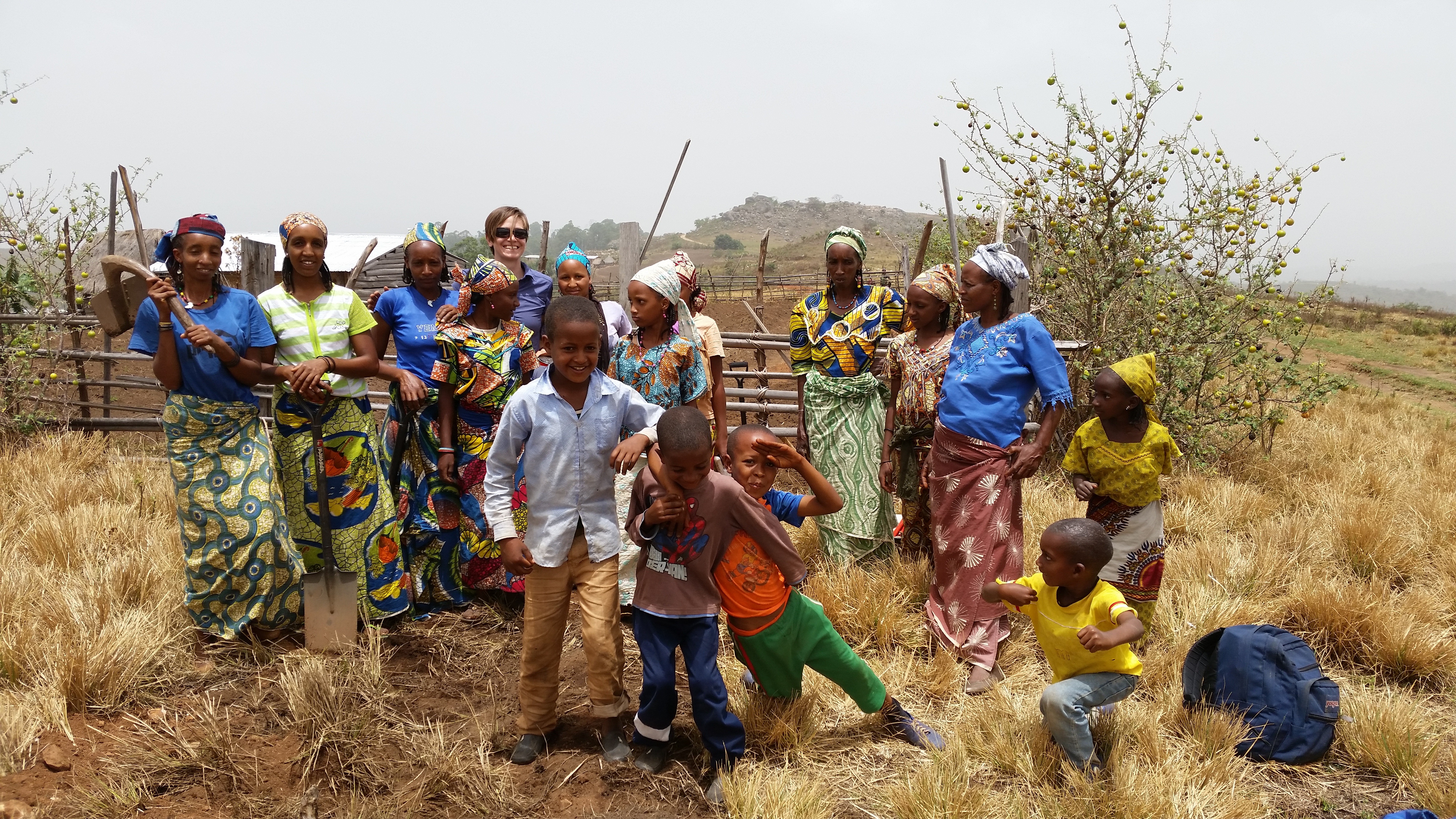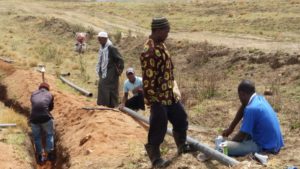 EWB-DC recently completed our sixth overall trip to Cameroon during March of 2016. Our amazing team included veteran travelers Angeline and Rob, and new travelers Aileen and Lina. This is the fourth implementation trip for the team, with one of the main objectives of continuing the pipeline installation from the water catchment area to the location of a future storage tank. After three days of manual labor, approximately 360 meters of pipeline were successfully installed.
EWB-DC recently completed our sixth overall trip to Cameroon during March of 2016. Our amazing team included veteran travelers Angeline and Rob, and new travelers Aileen and Lina. This is the fourth implementation trip for the team, with one of the main objectives of continuing the pipeline installation from the water catchment area to the location of a future storage tank. After three days of manual labor, approximately 360 meters of pipeline were successfully installed.
Beyond engineering, this trip also focused on community engagement and capacity building of the local Water Committee, recognizing the impact that the community and local stakeholders have on the long-term sustainability of the project. Our team met with the Mangi, Mburtu, Mbotop, and Mbororo community members and emphasized the importance of catchment area protection with each group. Some groups were informed and engaged, while other groups needed additional focus on the water system and how it would affect them. The team also visited local schools and engaged children with exercises to help promote the protection of the water catchment area, including making signs. 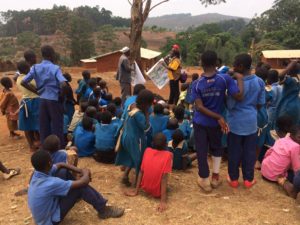
A couple of atypical events were also part of this trip. For one, the team had a productive meeting with the U.S. Embassy in Cameroon. This was the project’s first chance to engage with the embassy and they came away with great contacts and new relationships. In another exciting turn of events, our team got 15 minutes of fame by speaking about the project on the local radio station!
Travelers’ Perspectives
Our team members were divided into two teams with different tasks while in Cameroon. Rob and Lina focused on working with community members to resolve community concerns and to build their capacity to manage the system. Aileen and Angeline spent the majority of their time working with the community to continue laying pipeline for the water system.
Travel team members always have wonderful experiences during their time in-country for EWB-DC projects. This travel team unanimously agreed that the best part of the trip was engaging with the community. In particular, Aileen and Angeline enjoyed the singing, dancing, and drum playing in the evening.
“Almost every evening, we danced, drummed, and sang with the children and a few adults from the community. It was so amazing to listen to the songs led by a man or woman in the community, with the children singing along, and everyone dancing. The very last night, we took our “party” outside and danced, drummed, and sang under the moon in the cool air, and it was just amazing.” – Angeline
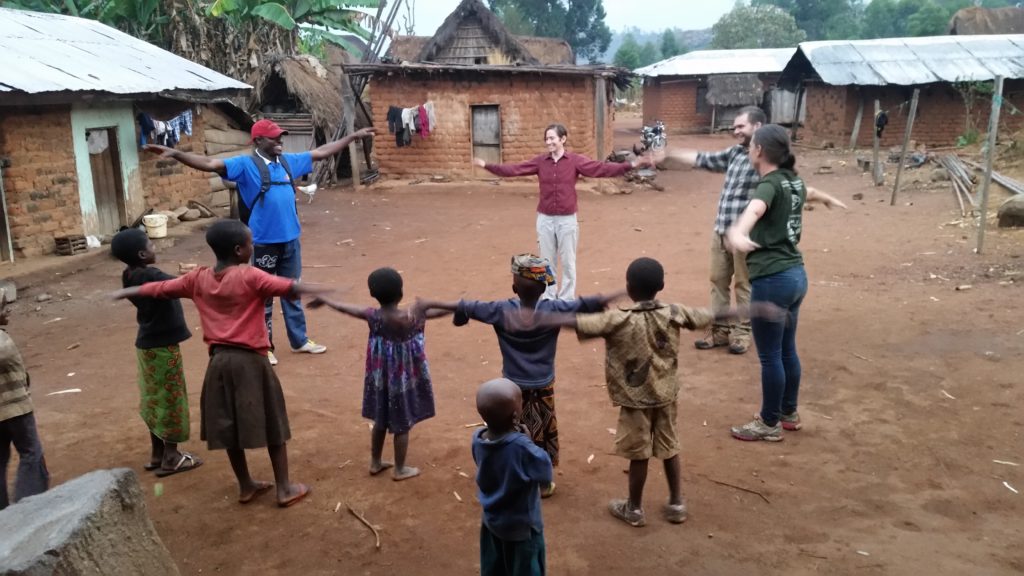 Lina and Rob appreciated their time speaking with stakeholders within the community. Being her first time in Cameroon, Lina cited many memorable moments such as spending time with women who were farming in Mburtu, learning music from their Mangi hosts and in-country partners, playing soccer with the kids at the Mangi school, and getting to meet some Peace Corps volunteers in the area.
Lina and Rob appreciated their time speaking with stakeholders within the community. Being her first time in Cameroon, Lina cited many memorable moments such as spending time with women who were farming in Mburtu, learning music from their Mangi hosts and in-country partners, playing soccer with the kids at the Mangi school, and getting to meet some Peace Corps volunteers in the area.
In addition to engaging with the people from a different culture, our team also expanded their pallets and enjoyed the food in Cameroon. When asked what their favorite food was during the trip, they listed off a wide variety of dishes, like the hearty fufu and njamajama (local staple foods of corn/cassava paste and stewed greens), egusi (stew with pumpkin seeds), mushroom soup, delicious cakes made by a community member, puff-puff (a local version of fried dough), yam stew, and even a spaghetti omelette.
As with any project, there were challenges to overcome. While days of rain and hail made it a struggle to complete implementation tasks, it was social challenges that proved the most difficult. The veteran travelers agreed the reality of working with many social and institutional complexities in the same community was sometimes challenging, and managing the expectations of the volunteers while getting the work done in the correct order was difficult. As noted by the new travelers, this was only increased by the struggle with communication due to a wide language barrier and broad cultural differences. However, members of the community always rose to the challenge and the group as a whole pushed forward with the project. On the lighter side, Lina also said that sleeping with loud chickens crowing in the morning definitely took some adjusting.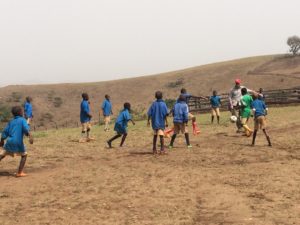
Overall, each traveler gained a deep personal experience and took something away from the trip. Lina said what opened her eyes the most was to see how much effort it took to get regular chores done every day, noting the strong contrast to our own lives back in the States. Rob, a seasoned traveler who had visited the project site before, said that he had not realized how much influence the NGO that built the original water system in Ntayi over 20 years ago had in the broader region–their water systems, in varying levels of repair, dot the landscape. These positive and long-term impacts on both young engineers and local communities are what EWB-DC aims to achieve with each of our many global projects.
“How can I help?”
EWB-DC has three active projects: one in Cameroon, one in Panama, and one in El-Salvador. All of our team members are volunteers who donate time, expertise, and energy after their jobs or days in classes. We are a mix of professionals and graduate students who came together to contribute various areas of expertise. Our efforts would not be possible without your support. Thank you!
Share this post on Twitter! [socialwrap align=”left”] [socialicon name=”fb” url=”https://www.facebook.com/ewbdc/” ][/socialicon] [socialicon name=”linkedin” url=”https://www.linkedin.com/groups/5137268″ ][/socialicon] [socialicon name=”twitter” url=”https://twitter.com/ewbdc” ][/socialicon] [/socialwrap]
